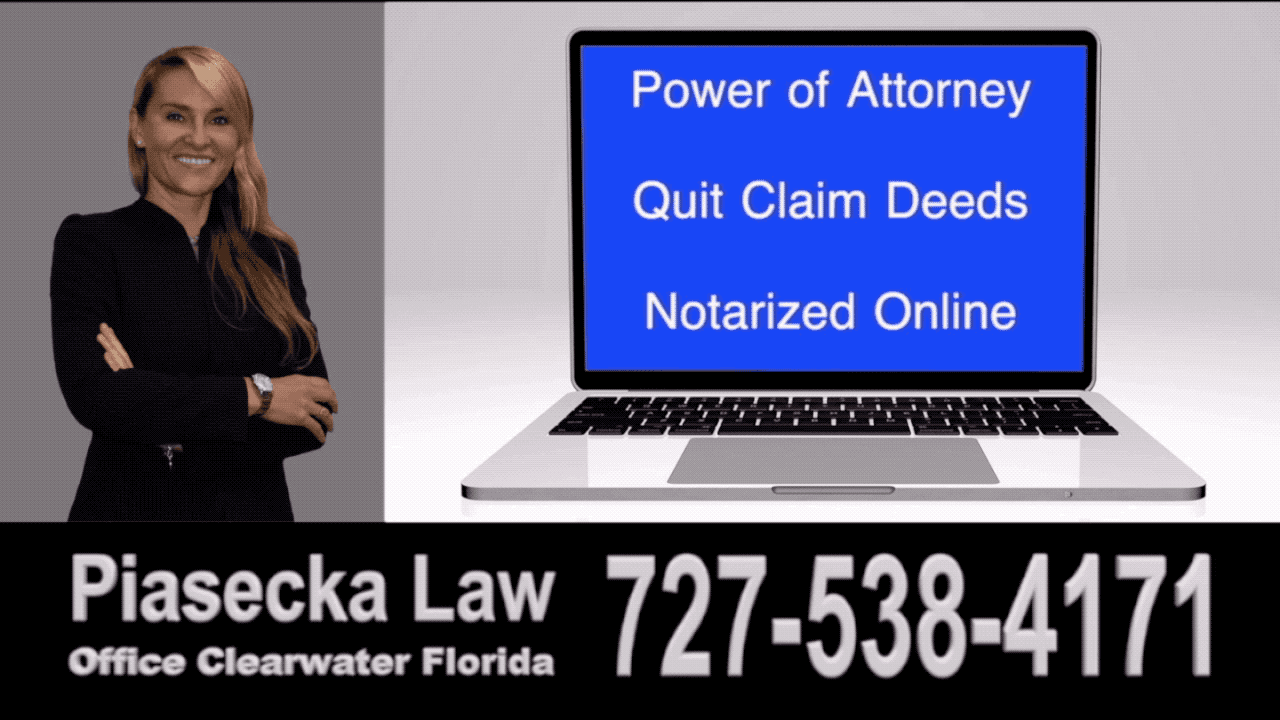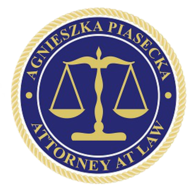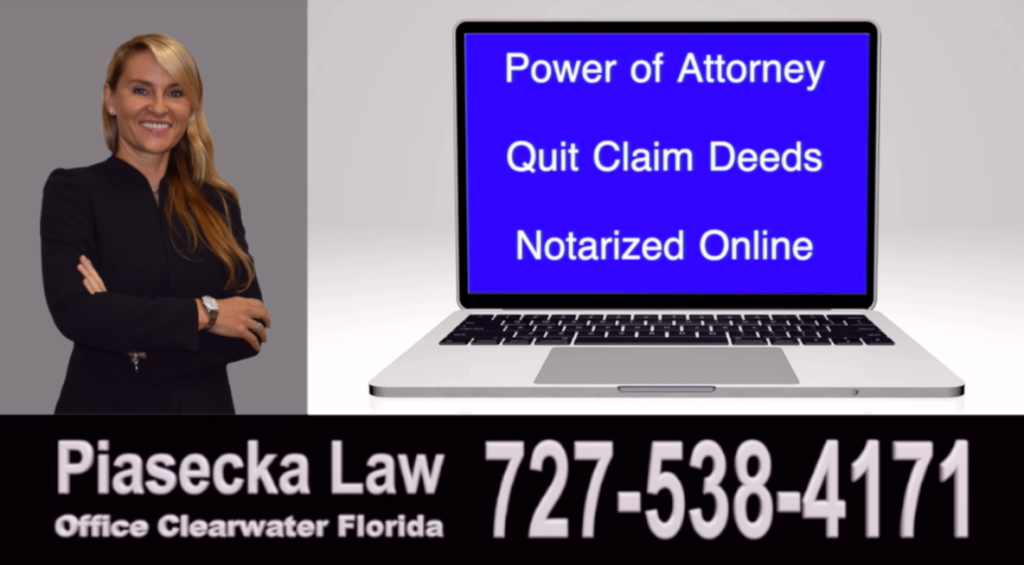



Online Creation and Notarization of Florida Power of Attorney & Quit Claim Deeds
Agnieszka Piasecka is an attorney and a notary public commissioned in the State of Florida. She can assist you with the creation and notarization of Florida legal documents including: Power of Attorney, Deeds, Quit Claim Deeds and Lady Bird Deeds / Enhanced Life Estate Deeds online (via internet).
For the online notarization of most Florida legal documents including: Power of Attorney, Deeds, Quit Claim Deeds and Lady Bird Deeds / Enhanced Life Estate Deeds, your physical presence in Florida is not necessary, but you have to be a US citizen and confirm that you desire for the notarial act to be performed by a Florida notary public and under the general law of this state.
To schedule an online appointment for the creation and online notarization of Florida legal documents, Power of Attorney and Quit Claim Deeds please call: 727-538-4171 / 813-786-3911 / 303-475-7212 or visit PiaseckaLaw.com
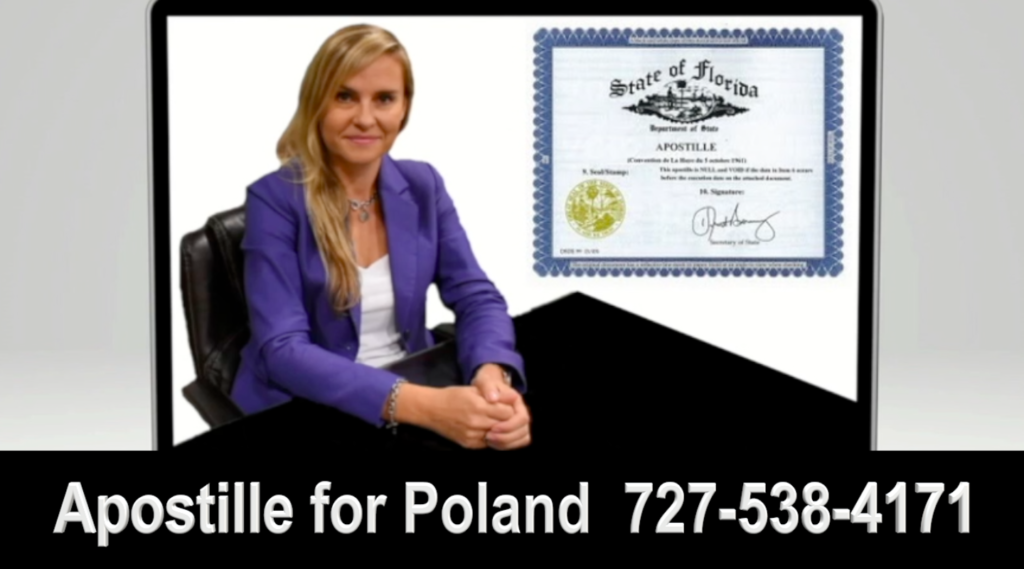
Apostille for Poland
Agnieszka Piasecka is an attorney in Poland and the State of Florida. She can assist you with Apostille for Poland, Apostille for Power of Attorney for Poland, Apostille for Disclaimer of Inheritance for Poland, Apostille and Online Notary Services for Other documents, and the Translation of legal documents for immigration and other use.
To obtain an Apostille for Poland please call: 727-538-4171 / 813-786-3911 / 303-475-7212 or visit PiaseckaLaw.com
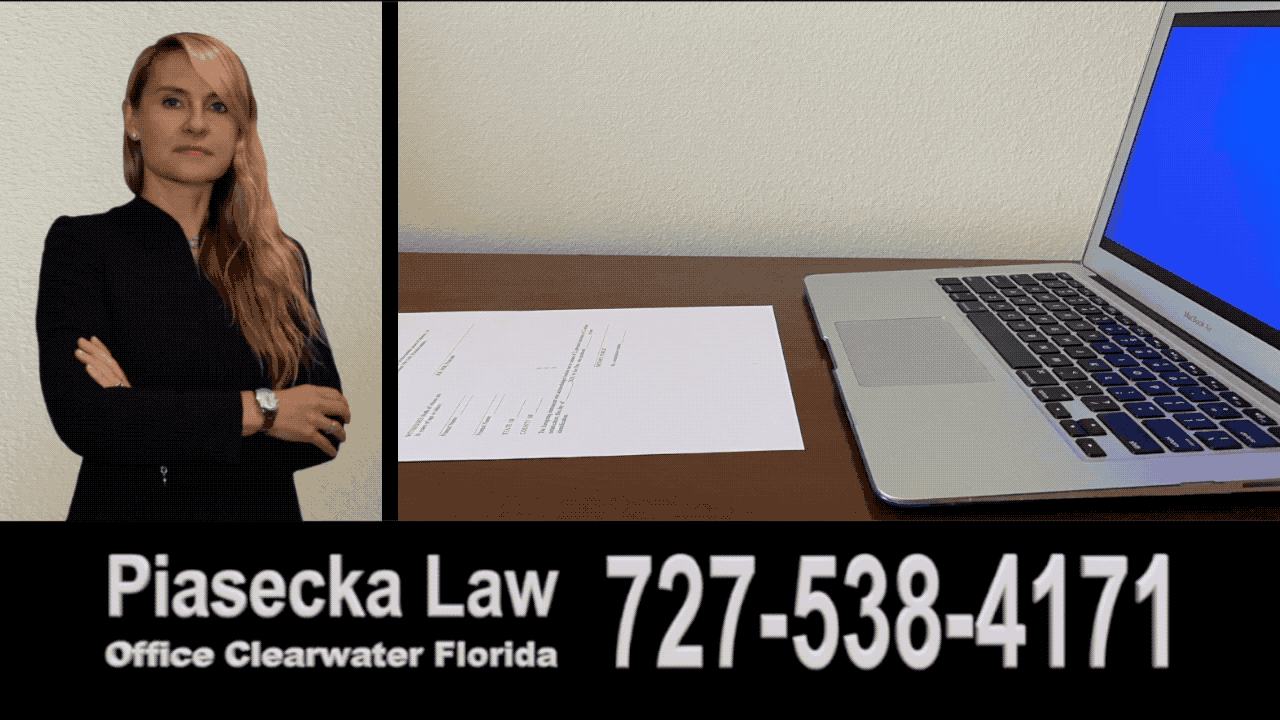
Florida Statutes CHAPTER 117 – NOTARIES PUBLIC
On June 7, 2019, HB 409 “Electronic Legal Documents” was signed into law. This law is in effect as of January 1, 2020.
PART II
ONLINE NOTARIZATIONS
http://www.leg.state.fl.us/statutes/index.cfm?App_mode=Display_Statute&URL=0100-0199/0117/0117.html
117.201 Definitions.
117.209 Authority to perform online notarizations.
117.215 Relation to other laws.
117.225 Registration; qualifications.
117.235 Performance of notarial acts.
117.245 Electronic journal of online notarizations.
117.255 Use of electronic journal, signature, and seal.
117.265 Online notarization procedures.
117.275 Fees for online notarization.
117.285 Supervising the witnessing of electronic records.
117.295 Standards for electronic and online notarization; rulemaking authority.
117.305 Relation to federal law.
117.201 Definitions.—As used in this part, the term:
(1) “Appear before,” “before,” or “in the presence of” means:
(a) In the physical presence of another person; or
(b) Outside of the physical presence of another person, but able to see, hear, and communicate with the person by means of audio-video communication technology.
(2) “Audio-video communication technology” means technology in compliance with applicable law which enables real-time, two-way communication using electronic means in which participants are able to see, hear, and communicate with one another.
(3) “Credential analysis” means a process or service, in compliance with applicable law, in which a third party aids a notary public in affirming the validity of a government-issued identification credential and data thereon through review of public or proprietary data sources.
(4) “Electronic,” “electronic record,” or “electronic signature” has the same meaning as provided in s. 668.50.
(5) “Errors and omissions insurance” means a type of insurance that provides coverage for potential errors or omissions in or relating to the notarial act and is maintained, as applicable, by the online notary public or his or her employer, or a Remote Online Notarization service provider.
(6) “Government-issued identification credential” means any approved credential for verifying identity under s. 117.05(5)(b)2.
(7) “Identity proofing” means a process or service in compliance with applicable law in which a third party affirms the identity of an individual through use of public or proprietary data sources, which may include by means of knowledge-based authentication or biometric verification.
(8) “Knowledge-based authentication” means a form of identity proofing based on a set of questions which pertain to an individual and are formulated from public or proprietary data sources.
(9) “Online notarization” means the performance of a notarial act using electronic means in which the principal appears before the notary public by means of audio-video communication technology.
(10) “Online notary public” means a notary public commissioned under part I of this chapter, a civil-law notary appointed under chapter 118, or a commissioner of deeds appointed under part IV of chapter 721, who has registered with the Department of State to perform online notarizations under this part.
(11) “Physical presence” means being in the same physical location as another person and close enough to see, hear, communicate with, and exchange credentials with that person.
(12) “Principal” means an individual whose electronic signature is acknowledged, witnessed, or attested to in an online notarization or who takes an oath or affirmation administered by the online notary public.
(13) “Record” means information that is inscribed on a tangible medium or that is stored in an electronic or other medium and is retrievable in perceivable form, including public records as defined in s. 119.011.
(14) “Remote Online Notarization service provider” or “RON service provider” means a person that provides audio-video communication technology and related processes, services, software, data storage, or other services to online notaries public for the purpose of directly facilitating their performance of online notarizations in compliance with this chapter and any rules adopted by the Department of State pursuant to s. 117.295.
(15) “Remote presentation” means transmission of an image of a government-issued identification credential that is of sufficient quality to enable the online notary public to identify the individual seeking the notary’s services and to perform credential analysis through audio-video communication technology.
History.—s. 6, ch. 2019-71.
117.209 Authority to perform online notarizations.—
(1) An online notary public may perform any of the functions authorized under part I of this chapter as an online notarization by complying with the requirements of this part and any rules adopted by the Department of State pursuant to s. 117.295, excluding solemnizing the rites of matrimony.
(2) If a notarial act requires a principal to appear before or in the presence of the online notary public, the principal may appear before the online notary public by means of audio-video communication technology that meets the requirements of this part and any rules adopted by the Department of State pursuant to s. 117.295.
(3) An online notary public physically located in this state may perform an online notarization as authorized under this part, regardless of whether the principal or any witnesses are physically located in this state at the time of the online notarization. A commissioner of deeds registered as an online notary public may perform an online notarization while physically located within or outside the state in accordance with the territorial limits of its jurisdiction and other limitations and requirements otherwise applicable to notarial acts by commissioners of deeds.
(4) The validity of an online notarization performed by an online notary public registered in this state shall be determined by applicable laws of this state regardless of the physical location of the principal or any witnesses at the time of the notarial act.
History.—s. 7, ch. 2019-71.
117.215 Relation to other laws.—
(1) If a provision of law requires a notary public or other authorized official of this state to notarize a signature or a statement, to take an acknowledgment of an instrument, or to administer an oath or affirmation so that a document may be sworn, affirmed, made under oath, or subject to penalty of perjury, an online notarization performed in accordance with the provisions of this part and any rules adopted hereunder satisfies such requirement.
(2) If a provision of law requires a signature or an act to be witnessed, compliance with the online electronic witnessing standards prescribed in s. 117.285 and any rules adopted thereunder satisfies that requirement.
History.—s. 8, ch. 2019-71.
117.225 Registration; qualifications.—A notary public, a civil-law notary appointed under chapter 118, or a commissioner of deeds appointed under part IV of chapter 721 may complete registration as an online notary public with the Department of State by:
(1) Holding a current commission as a notary public under part I of this chapter, an appointment as a civil-law notary under chapter 118, or an appointment as a commissioner of deeds under part IV of chapter 721, and submitting a copy of such commission or proof of such appointment with his or her registration.
(2) Certifying that the notary public, civil-law notary, or commissioner of deeds registering as an online notary public has completed a classroom or online course covering the duties, obligations, and technology requirements for serving as an online notary public.
(3) Paying a notary public registration fee as required by s. 113.01.
(4) Submitting a registration as an online notary public to the Department of State, signed and sworn to by the registrant.
(5) Identifying the RON service provider whose audio-video communication technology and processes for credential analysis and identity-proofing technologies the registrant intends to use for online notarizations, and confirming that such technology and processes satisfy the requirements of this chapter and any rules adopted by the Department of State pursuant to s. 117.295.
(6) Providing evidence satisfactory to the Department of State that the registrant has obtained a bond in the amount of $25,000, payable to any individual harmed as a result of a breach of duty by the registrant acting in his or her official capacity as an online notary public, conditioned for the due discharge of the office, and on such terms as are specified in rule by the Department of State as reasonably necessary to protect the public. The bond shall be approved and filed with the Department of State and executed by a surety company duly authorized to transact business in this state. Compliance by an online notary public with this requirement shall satisfy the requirement of obtaining a bond under s. 117.01(7).
(7) Providing evidence satisfactory to the Department of State that the registrant acting in his or her capacity as an online notary public is covered by an errors and omissions insurance policy from an insurer authorized to transact business in this state, in the minimum amount of $25,000 and on such terms as are specified by rule by the Department of State as reasonably necessary to protect the public.
History.—s. 9, ch. 2019-71.
117.235 Performance of notarial acts.—
(1) An online notary public is subject to part I of this chapter to the same extent as a notary public appointed and commissioned only under that part, including the provisions of s. 117.021 relating to electronic notarizations.
(2) An online notary public may perform notarial acts as provided by part I of this chapter in addition to performing online notarizations as authorized and pursuant to the provisions of this part.
History.—s. 10, ch. 2019-71.
117.245 Electronic journal of online notarizations.—
(1) An online notary public shall keep one or more secure electronic journals of online notarizations performed by the online notary public. For each online notarization, the electronic journal entry must contain all of the following:
(a) The date and time of the notarization.
(b) The type of notarial act.
(c) The type, the title, or a description of the electronic record or proceeding.
(d) The name and address of each principal involved in the transaction or proceeding.
(e) Evidence of identity of each principal involved in the transaction or proceeding in any of the following forms:
1. A statement that the person is personally known to the online notary public.
2. A notation of the type of government-issued identification credential provided to the online notary public.
(f) An indication that the principal satisfactorily passed the identity proofing.
(g) An indication that the government-issued identification credential satisfied the credential analysis.
(h) The fee, if any, charged for the notarization.
(2) The online notary public shall retain an uninterrupted and unedited copy of the recording of the audio-video communication in which an online notarization is performed. The recording must include all of the following:
(a) Appearance by the principal and any witness before the online notary public.
(b) Confirmation of the identity of the principal and any witness.
(c) A general description or identification of the records to be signed.
(d) At the commencement of the recording, recitation by the online notary public of information sufficient to identify the notarial act.
(e) A declaration by the principal that his or her signature on the record is knowingly and voluntarily made.
(f) All of the actions and spoken words of the principal, notary public, and any required witness during the entire online notarization, including the signing of any records before the online notary public.
(3) The online notary public shall take reasonable steps to:
(a) Ensure the integrity, security, and authenticity of online notarizations.
(b) Maintain a backup record of the electronic journal required by subsection (1).
(c) Protect the electronic journal, the backup record, and any other records received by the online notary public from unauthorized access or use.
(4) The electronic journal required under subsection (1) and the recordings of audio-video communications required under subsection (2) shall be maintained for at least 10 years after the date of the notarial act. However, a full copy of the recording of the audio-video communication required under subsection (2) relating to an online notarization session that involves the signing of an electronic will must be maintained by a qualified custodian in accordance with chapters 731 and 732. The Department of State maintains jurisdiction over the electronic journal and audio-video communication recordings to investigate notarial misconduct for a period of 10 years after the date of the notarial act. The online notary public, a guardian of an incapacitated online notary public, or the personal representative of a deceased online notary public may, by contract with a secure repository in accordance with any rules established under this chapter, delegate to the repository the online notary public’s duty to retain the electronic journal and the required recordings of audio-video communications, provided that the Department of State is notified of such delegation of retention duties to the repository within 30 days thereafter, including the address and contact information for the repository. If an online notary public delegates to a secure repository under this section, the online notary public shall make an entry in his or her electronic journal identifying such repository, and provide notice to the Department of State as required in this subsection.
(5) An omitted or incomplete entry in the electronic journal does not impair the validity of the notarial act or of the electronic record which was notarized, but may be introduced as evidence to establish violations of this chapter; as evidence of possible fraud, forgery, impersonation, duress, incapacity, undue influence, minority, illegality, 1or unconscionability; or for other evidentiary purposes. However, if the recording of the audio-video communication required under subsection (2) relating to the online notarization of the execution of an electronic will cannot be produced by the online notary public or the qualified custodian, the electronic will shall be treated as a lost or destroyed will subject to s. 733.207.
History.—s. 11, ch. 2019-71.
1Note.—The word “or” was inserted by the editors to improve clarity.
117.255 Use of electronic journal, signature, and seal.—An online notary public shall:
(1) Take reasonable steps to ensure that any registered device used to create an electronic seal is current and has not been revoked or terminated by the issuing or registering authority of the device.
(2) Keep the electronic journal and electronic seal secure and under his or her sole control, which includes access protection using passwords or codes under control of the online notary public. The online notary public may not allow another person to use the online notary public’s electronic journal, electronic signature, or electronic seal, other than a RON service provider or other authorized person providing services to an online notary public to facilitate performance of online notarizations.
(3) Attach or logically associate the electronic signature and seal to the electronic notarial certificate of an electronic record in a manner that is capable of independent verification using tamper-evident technology that renders any subsequent change or modification to the electronic record evident.
(4) Notify an appropriate law enforcement agency and the Department of State of any unauthorized use of or compromise to the security of the electronic journal, official electronic signature, or electronic seal within 7 days after discovery of such unauthorized use or compromise to security.
(5) Make electronic copies, upon request, of the pertinent entries in the electronic journal and provide access to the related audio-video communication recordings to the following persons:
(a) The parties to an electronic record notarized by the online notary public;
(b) The qualified custodian of an electronic will notarized by the online notary public;
(c) The title agent, settlement agent, or title insurer who insured the electronic record or engaged the online notary public with regard to a real estate transaction;
(d) The online notary public’s RON service provider whose services were used by the online notary public to notarize the electronic record;
(e) Any person who is asked to accept a power of attorney that was notarized by the online notary public;
(f) The Department of State pursuant to a notary misconduct investigation; and
(g) Any other persons pursuant to a subpoena, court order, law enforcement investigation, or other lawful inspection demand.
(6) The online notary public may charge a fee not to exceed $20 per transaction record for making and delivering electronic copies of a given series of related electronic records, except if requested by:
(a) A party to the electronic record;
(b) In a real estate transaction, the title agent, settlement agent, or title insurer who insured the electronic record or engaged the online notary public with regard to such transaction; or
(c) The Department of State pursuant to an investigation relating to the official misconduct of an online notary public.
If the online notary public does charge a fee, the online notary public shall disclose the amount of such fee to the requester before making the electronic copies.
History.—s. 12, ch. 2019-71.
117.265 Online notarization procedures.—
(1) An online notary public physically located in this state may perform an online notarization that meets the requirements of this part regardless of whether the principal or any witnesses are physically located in this state at the time of the online notarization. A commissioner of deeds registered as an online notary public may perform an online notarization while physically located within or outside of this state in accordance with the territorial limits of its jurisdiction and other limitations and requirements otherwise applicable to notarial acts by commissioners of deeds. An online notarization performed in accordance with this chapter is deemed to have been performed within this state and is governed by the applicable laws of this state.
(2) In performing an online notarization, an online notary public shall confirm the identity of a principal and any witness appearing online, at the time that the signature is taken, by using audio-video communication technology and processes that meet the requirements of this part and of any rules adopted hereunder and record the two-way audio-video conference session between the notary public and the principal and any witnesses. A principal may not act in the capacity of a witness for his or her own signature in an online notarization.
(3) In performing an online notarization of a principal not located within this state, an online notary public must confirm, either verbally or through the principal’s written consent, that the principal desires for the notarial act to be performed by a Florida notary public and under the general law of this state.
(4) An online notary public shall confirm the identity of the principal by:
(a) Personal knowledge of each principal; or
(b) All of the following, as such criteria may be modified or supplemented in rules adopted by the Department of State pursuant to s. 117.295:
1. Remote presentation of a government-issued identification credential by each principal.
2. Credential analysis of each government-issued identification credential.
3. Identity proofing of each principal in the form of knowledge-based authentication or another method of identity proofing that conforms to the standards of this chapter.
If the online notary public is unable to satisfy subparagraphs 1.-3., or if the databases consulted for identity proofing do not contain sufficient information to permit authentication, the online notary public may not perform the online notarization.
(5) An online notary public may change his or her RON service provider or providers from time to time, but shall notify the Department of State of such change within 30 days thereafter.
(6) The online notary public or his or her RON service provider shall take reasonable steps to ensure that the audio-video communication technology used in an online notarization is secure from unauthorized interception.
(7) The electronic notarial certificate for an online notarization must include a notation that the notarization is an online notarization which may be satisfied by placing the term “online notary” in or adjacent to the online notary public’s seal.
(8) Except where otherwise expressly provided in this part, the provisions of part I of this chapter apply to an online notarization and an online notary public.
(9) Any failure to comply with the online notarization procedures set forth in this section does not impair the validity of the notarial act or the electronic record that was notarized, but may be introduced as evidence to establish violations of this chapter or as an indication of possible fraud, forgery, impersonation, duress, incapacity, undue influence, minority, illegality, 1or unconscionability, or for other evidentiary purposes. This subsection may not be construed to alter the duty of an online notary public to comply with this chapter and any rules adopted hereunder.
History.—s. 13, ch. 2019-71.
1Note.—The word “or” was inserted by the editors to improve clarity.
117.275 Fees for online notarization.—An online notary public or the employer of such online notary public may charge a fee, not to exceed $25, for performing an online notarization under this part. Fees for services other than notarial acts are not governed by this section.
History.—s. 14, ch. 2019-71.
117.285 Supervising the witnessing of electronic records.—An online notary public may supervise the witnessing of electronic records by the same audio-video communication technology used for online notarization, as follows:
(1) The witness may be in the physical presence of the principal or remote from the principal provided the witness and principal are using audio-video communication technology.
(2) If the witness is remote from the principal and viewing and communicating with the principal by means of audio-video communication technology, the witness’s identity must be verified in accordance with the procedures for identifying a principal as set forth in s. 117.265(4). If the witness is in the physical presence of the principal, the witness must confirm his or her identity by stating his or her name and current address on the audio-video recording as part of the act of witnessing.
(3) The act of witnessing an electronic signature means the witness is either in the physical presence of the principal or present through audio-video communication technology at the time the principal affixes the electronic signature and the witness hears the principal make a statement to the effect that the principal has signed the electronic record.
(4) A witness remote from the principal and appearing through audio-video communication technology must verbally confirm that he or she is a resident of and physically located within the United States or a territory of the United States at the time of witnessing.
(5) Notwithstanding subsections (2) and (3), if an electronic record to be signed is a will under chapter 732, a trust with testamentary aspects under chapter 736, a health care advance directive, a waiver of spousal rights under s. 732.701 or s. 732.702, or a power of attorney authorizing any of the transactions enumerated in s. 709.2208, the following shall apply:
(a) Prior to facilitating witnessing of an instrument by means of audio-video communication technology, a RON service provider shall require the principal to answer the following questions in substantially the following form:
1. Are you under the influence of any drug or alcohol today that impairs your ability to make decisions?
2. Do you have any physical or mental condition or long-term disability that impairs your ability to perform the normal activities of daily living?
3. Do you require assistance with daily care?
(b) If any question required under paragraph (a) is answered in the affirmative, the principal’s signature on the instrument may only be validly witnessed by witnesses in the physical presence of the principal at the time of signing.
(c) Subsequent to submission of the answers required under paragraph (a), the RON service provider shall give the principal written notice in substantially the following form:
NOTICE: If you are a vulnerable adult as defined in s. 415.102, Florida Statutes, the documents you are about to sign are not valid if witnessed by means of audio-video communication technology. If you suspect you may be a vulnerable adult, you should have witnesses physically present with you before signing.
(d) The act of witnessing an electronic signature through the witness’s presence by audio-video communication technology is valid only if, during the audio-video communication, the principal provides verbal answers to all of the following questions, each of which must be asked by the online notary public in substantially the following form:
1. Are you currently married? If so, name your spouse.
2. Please state the names of anyone who assisted you in accessing this video conference today.
3. Please state the names of anyone who assisted you in preparing the documents you are signing today.
4. Where are you currently located?
5. Who is in the room with you?
(e) An online notary public shall consider the responses to the questions specified in paragraph (d) in carrying out of the duties of a notary public as set forth in s. 117.107(5).
(f) A principal’s responses to the questions in paragraphs (a) and (d) may be offered as evidence regarding the validity of the instrument, but an incorrect answer may not serve as the sole basis to invalidate an instrument.
(g) The presence of a witness with the principal at the time of signing by means of audio-video communication technology is not effective for witnessing the signature of a principal who is a vulnerable adult as defined in s. 415.102. The contestant of an electronic record has the burden of proving that the principal was a vulnerable adult at the time of executing the electronic record.
(h) Nothing in this subsection shall preclude a power of attorney, which includes banking or investment powers enumerated in s. 709.2208, from being effective with respect to any other authority granted therein or with respect to the agent’s authority in connection with a real property, commercial, or consumer transaction or loan, to exercise any power specified therein or to execute and deliver instruments obligating the principal or to draw upon the proceeds of such transaction or loan.
(i) The electronic record containing an instrument signed by witnesses who were present with the principal by means of audio-video communication technology shall contain a perceptible indication of their presence by such means.
(j) Nothing in this subsection shall affect the application of s. 709.2119.
(6) Pursuant to subpoena, court order, an authorized law enforcement inquiry, or other lawful request, a RON service provider or online notary public shall provide:
(a) The last known address of each witness who witnessed the signing of an electronic record using audio-video communication technology under this section.
(b) A principal’s responses to the questions in paragraph (5)(a) or paragraph (5)(b), as applicable.
(c) An uninterrupted and unedited copy of the recording of the audio-video communication in which an online notarization is performed.
(7) Except as set forth in s. 709.2202, an act of witnessing performed pursuant to this section satisfies any requirement that the witness must be a subscribing or attesting witness or must be in the presence of the principal at the time of signing.
(8) The law of this state governs the validity of witnessing supervised by an online notary public pursuant to this section, regardless of the physical location of the witness at the time of witnessing. State and federal courts in this state have subject matter jurisdiction over any dispute arising out of an act of witnessing pursuant to this section, and may issue subpoenas for records or to require the appearance of witnesses in relation thereto in accordance with applicable law.
History.—s. 15, ch. 2019-71.
117.295 Standards for electronic and online notarization; rulemaking authority.—
(1) For purposes of this part, the Department of State may adopt rules necessary to implement the requirements of this chapter and to set standards for online notarization which include, but are not limited to:
(a) Improvements in technology and methods of assuring the identity of principals and the security of an electronic record, including tamper-evident technologies in compliance with the standards adopted pursuant to s. 117.021 which apply to online notarizations.
(b) Education requirements for online notaries public and the required terms of bonds and errors and omissions insurance, but not including the amounts of such bonds and insurance policies.
(c) Identity proofing, credential analysis, unauthorized interception, remote presentation, audio-video communication technology, and retention of electronic journals and copies of audio-video communications recordings in a secure repository.
(2) By January 1, 2020, the Department of State shall adopt forms, processes, and interim or emergency rules necessary to accept applications from and register online notaries public pursuant to s. 117.225.
(3) Until such time as the Department of State adopts rules setting standards that are equally or more protective, the following minimum standards shall apply to any online notarization performed by an online notary public of this state or his or her RON service provider:
(a) Use of identity proofing by means of knowledge-based authentication which must have, at a minimum, the following security characteristics:
1. The principal must be presented with five or more questions with a minimum of five possible answer choices per question.
2. Each question must be drawn from a third-party provider of public and proprietary data sources and be identifiable to the principal’s social security number or other identification information, or the principal’s identity and historical events records.
3. Responses to all questions must be made within a 2-minute time constraint.
4. The principal must answer a minimum of 80 percent of the questions correctly.
5. The principal may be offered one additional attempt in the event of a failed attempt.
6. During the second attempt, the principal may not be presented with more than three questions from the prior attempt.
(b) Use of credential analysis using one or more commercially available automated software or hardware processes that are consistent with sound commercial practices; that aid the notary public in verifying the authenticity of the credential by analyzing the integrity of visual, physical, or cryptographic security features to indicate that the credential is not fraudulent or inappropriately modified; and that use information held or published by the issuing source or authoritative source, as available, to confirm the validity of credential details. The output of the credential analysis process must be provided to the online notary public performing the notarial act.
(c) Use of audio-video communication technology in completing online notarizations that must meet the following requirements:
1. The signal transmission must be reasonably secure from interception, access, or viewing by anyone other than the participants communicating.
2. The technology must provide sufficient audio clarity and video resolution to enable the notary to communicate with the principal and any witness, and to confirm the identity of the principal and any witness, as required, using the identification methods described in s. 117.265.
(4) A RON service provider is deemed to have satisfied tamper-evident technology requirements by use of technology that renders any subsequent change or modification to the electronic record evident.
(5) In addition to any coverage it elects to provide for individual online notaries public, maintenance of errors and omissions insurance coverage by a RON service provider in a total amount of at least $250,000 in the annual aggregate with respect to potential errors or omissions in or relating to the technology or processes provided by the RON service provider. An online notary public is not responsible for the security of the systems used by the principal or others to access the online notarization session.
(6) A 2-hour in-person or online course addressing the duties, obligations, and technology requirements for serving as an online notary public offered by the Florida Land Title Association; the Real Property, Probate and Trust Law Section of the Florida Bar; the Florida Legal Education Association, Inc.; the Department of State; or a vendor approved by the Department of State shall satisfy the education requirements of s. 117.225(2). Each such provider shall make the in-person or online course generally available to all applicants. Regardless of membership in the provider’s organization, the provider shall charge each attendee the same cost for the course unless the course is provided in conjunction with a regularly scheduled meeting of the provider’s membership.
(7) The rulemaking required under this section is exempt from s. 120.541(3).
History.—s. 16, ch. 2019-71.
